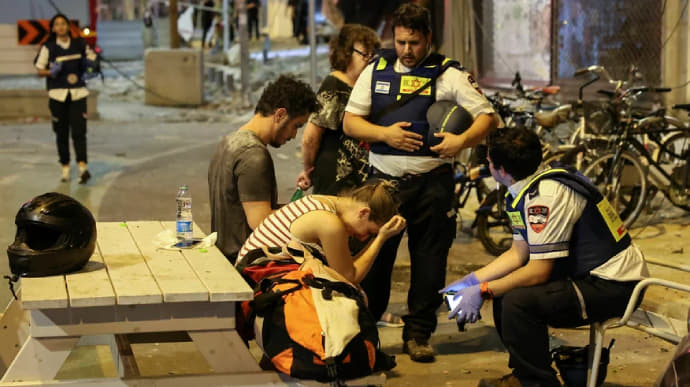Laughter in the face of death: Ukraine’s stand-up scene booming amid Russia’s war
"When we joke about what frightens us, we fear it less. We joke about death - we start to fear it less. We joke about the enemy - we fear the enemy less," said comedian Anton Tymoshenko, explaining how humor allows Ukrainians to process the tragedy of Russia's war.
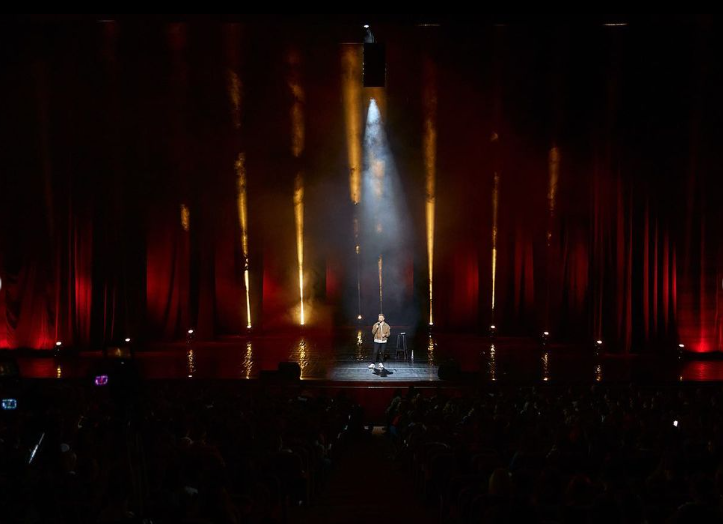

One wartime evening last October, amid air raids from another potential Russian attack on Ukraine, over 3,457 people gathered in the Palace of Ukraine in Kyiv — the country’s largest concert hall and arts institution.
They had come to watch a comedian, seeking light moments amid the darkness, uncertainty, brutality, and grief caused by Russia’s aggression.

“So who goes to the shelters [during air raids]?” asked the man on stage, inquiring who of his audience would sacrifice their night slumber or daily tasks to seek, as officially advised, the safety of bunkers. This exercise has become routinely ignored in Kyiv as Russian missile strikes became ordinary, and the daily grind prevailed over time-consuming security measures. иифтвш
They applauded.
“How many of you, Kyiv non-conformists, are there? Only 70?” he asked. “I’m actually grateful to you,” the comedian continued. “I do stand-up comedy, and I constantly need to write new jokes, to not tell the old ones. But now I realize I don’t need to write new jokes, the audience will rotate.”
People laughed.
“Woohooo, we’ll die,” Anton Tymoshenko, the first comedian to gather an audience of over 3,000 at the Palace of Ukraine, finished the first joke of his show.
Laughter during the war
“Stand-up comedy is a ‘mental holiday’ from the shelling and serves as psychological therapy,” said Tymoshenko.
For most people, war is a time of anxiety, fear, and uncertainty. However, Ukrainians have weaponized comedy to boost morale, unite, and ridicule the absurdity of the Russian invaders.
“We are getting used to the war. The human brain is capable of adapting and relaxing over time. I don’t know if this is good or bad, but this is a human’s evolutionary trait,” the comedian Anton continued his performance by describing one of the common things all Ukrainians go through.
“Earlier, there were alerts from the State Emergency Service [very loud and ringing sound – ed.], they kept us a little more on our toes, didn’t they? There was that spark of life. I already miss them, isn’t that funny? You wake up in the morning, suddenly you hear [he screams – ed.] with a heart attack, and you run to the shelter. But you know, everyone had this. It was like an all-Ukrainian unifying heart attack day. A new day of unity!”
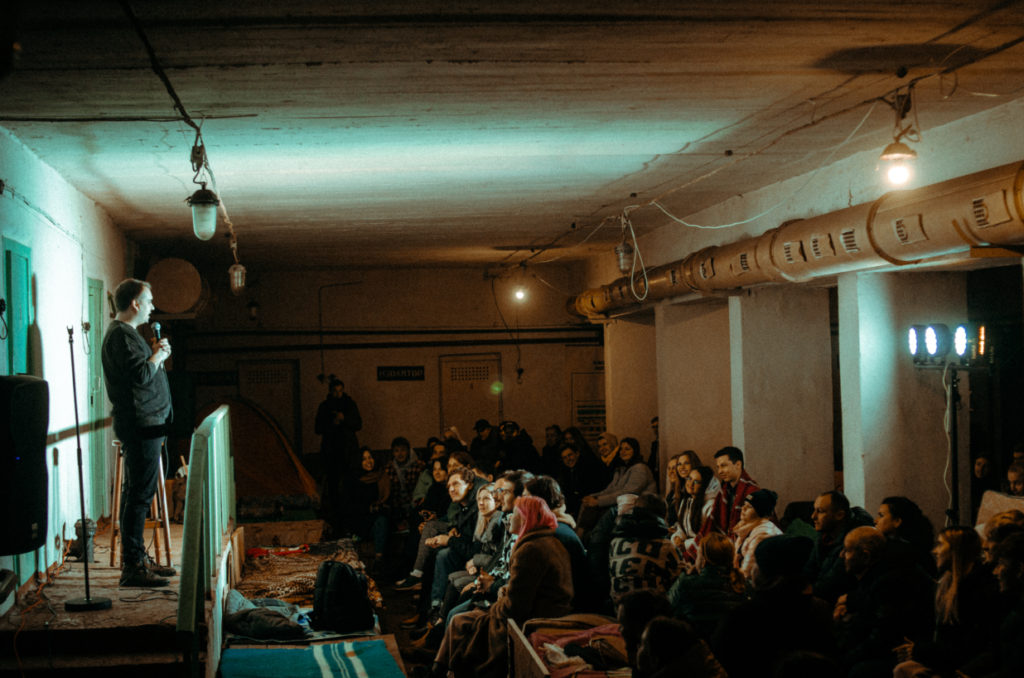
Oleksandr Avdeiev, a psychiatrist, cognitive behavioral therapist, and author at the Vihola publishing house, said that humor helps people cope with anxiety, adapt to new critical conditions, and enables them to act.
The psychiatrist said the human body has several systems: the sympathetic and the parasympathetic. He explained that the sympathetic system stimulates the activity of human organs while the parasympathetic system relaxes them. When people laugh, the tension of the diaphragm stimulates the nerve that activates the parasympathetic system and calms the organism.
“That’s why laughter is the fastest way to receive a psychological release, as it affects the body here and now,” he said.
Comedy also offers a constructive way to process the tragedy, downplaying it. “Laughing at our enemies or fears denies them power over us,” according to Avdeiev.
Comedian Anton Tymoshenko said that humor, even in wartime, has never been separate from tragedy. In stand-up, jokes are built on some kind of tragedy. This makes them stronger and funnier, he said. “When we joke about what frightens us, we fear it less. We joke about death – we start to fear it less. We joke about the enemy – we fear the enemy less,” Tymoshenko said.
“Russia was going to strike Ukraine with a nuclear weapon. But nothing has occurred yet,” the comedian ventured into serious territory, started talking about one of the things that terrified Ukrainians the most, the nuclear threats by Russia. “They only make promises. As always!”
“Clap your hands, who else is afraid of a nuclear strike on Ukraine?” the comedian asked. The audience applauded. “You are always the minority,” he said. “Because the majority is like, ‘Let’s do it, I don’t mind having some days off. I don’t want to go to work anymore.’ They will call their boss and say, ‘Hello, I’m not coming to work today, something is melting me down.'”
“It would be even better if the nuclear strike happened before Easter to combine the holidays to make them longer,” the comedian said. “We would have three days off for the nuclear strike before Easter and two more after Easter.”
“Death from a nuclear strike is for the rich,” the comedian continued. “Because they [Russians – ed.] will strike the center of Kyiv with nuclear weapons. My most realistic death is an Iranian Shahed. And this is a bit sad. Have you heard how they work?” Tymoshenko asked the audience. “It’s demoralizing: this sound over your head ‘iiiiiii’ (like an old moped engine – ed.). It sounds like the cheapest death. You know, like the cheapest death! And this is your Antoha!” the comedian Anton was ironizing himself. “This is how the ‘standard package’ sounds. It feels like you ordered your death from AliExpress, and you chose the cheapest shipping.”
“The sound of a nuclear strike in the center will be cool. There will be Oppenheimer, a Hollywood death sound, something like ‘babah.’ And I will have ‘iiiii’, which sounds like my whole life up to this point.”
Reference to World War II
Throughout World War II, humor was also increasingly deployed as a weapon against enemies by all major players, including the USA and USSR. A prime example was Charlie Chaplin’s film “The Great Dictator,” in which the actor mocked Hitler.
The message conveyed that Hynkel, the prototype of Hitler in the film, was not a brilliant strategist or a formidable leader. He was portrayed as an overgrown adolescent, demonstrated by the sublime set piece in which he danced with an inflatable globe, fantasizing about being the “emperor of the world.” Hitler’s image was of an insecure buffoon who bluffed, cheated, obsessed over his public image, reveled in the opulence of his extravagant quarters, and reversed his pivotal policies in order to prolong his time in power.

Ukrainian comedians ridicule the Russian dictator Putin in the same way, mocking Putin for hiding himself in a bunker thousands of kilometers away from the Kremlin located in the Ural Mountains. Those bunkers resemble entire underground cities, a huge giant void in the ground at great depth. Such bunkers were built back during the Soviet Union period in case of a nuclear war.
However, since the beginning of Russia’s full-scale invasion of Ukraine, the Kremlin dictator’s panic only intensified. The common feature of dictators is that they are afraid of their own death.
The American comedian and actor Bob Hope supported soldiers in another way. He continuously visited military bases worldwide from 1941 to 1945 and performed in front of soldiers.
Nowadays, during Russia’s war against Ukraine, Ukrainian comedians also use this way of maintaining soldiers’ mental health.
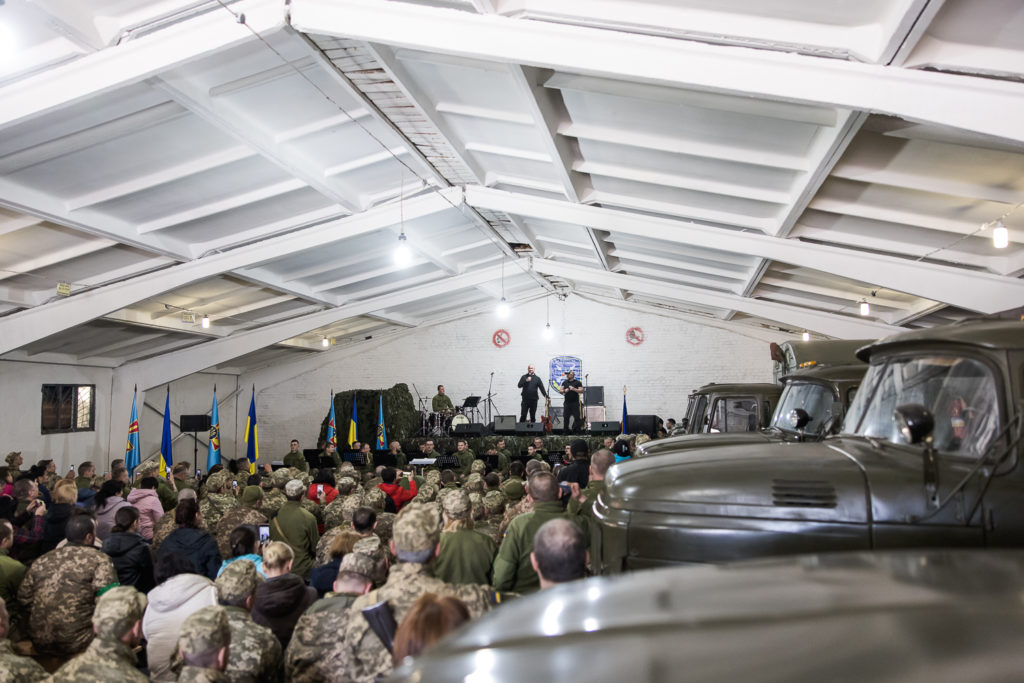
Credit: Forbes
Laughing together at common problems is the main principle of humor in wartime, according to psychiatrist Avdeiev. However, he said, the context in which it’s told is crucial.
“The same joke can play out very differently depending on the context. If people in Kyiv crack jokes about hiding from missiles in the bathtub [in such a way people in Ukraine use the rule of two walls, hiding in a windowless room with solid walls: bathroom, corridor, toilet, storage room – ed.], it can be justified as they’re in the proper context. But if a Kyiv resident, who now lives in Portugal, tells the same joke, it will likely come off differently.”
Comedians also believe they have more responsibility to tell jokes in wartime, as “every Ukrainian has had a different experience in this war.”
“Someone has lost everything. Someone has just moved,” the comedian Tymoshenko said. “Humor is like a minefield at this time – you must step carefully and choose your direction wisely. It’s very easy to make a mistake.”
But overall, comedians agree that humor unites people and strengthens the nation’s spirit to face common challenges.
“Attending comedy shows unites people physically and emotionally,” Tymoshenko said. “Physically, it brings people together in the same space. Emotionally, laughing at the same jokes helps people realize they are not alone in facing the same difficulties.”Finding the funny and sad in a usual situation is not difficult. It’s a normal human reaction. But if you can find the funny in a critical situation and tune in to an ironic perception, it shows people’s strength,” Tymoshenko said.
Stand-up comedians flourish in wartime Ukraine
The demand for comedy shows demonstrates the effectiveness of humor as a tool for overcoming fear and tension, which helps build a nation’s unity.
Over the two years of Russia’s war, YouTube followers of Ukrainian standup channels have skyrocketed. Particularly, Underground Standup has grown from 80,000 to 220,000. The viewership of individual shows has grown as well: some shows on the Stand Up Battle Club channel have exceeded reached 9.5 million views.
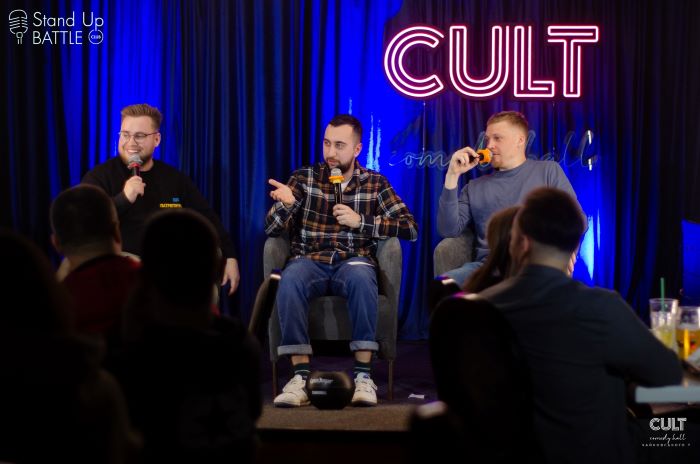
Many young stand-up comedians have emerged after Russia’s full-scale invasion, gathering large audiences offline and online. Ukrainian stand-up comedian Vasyl Baidak gathered 998,000 views on “A Stand-up Show About Relatives in Russia and Returning to Kyiv” and 918,000 on “A Comedy of Observation of the Absurd.”

Tymoshenko assembled his sold-out show at the Palace of Ukraine just 1.5 months after starting his promotional campaign. His show, “On the Verge,” gathered 632,000 views on YouTube after the offline performance in the Palace of Ukraine.
The comedian believes the war is not the only reason stand-up comedy has flourished in Ukraine these years. He believes that the war only boosted the tendency of the increased demand for comedy in Ukraine. “Generations of younger people have come to the sector, so they bring progressive values,” he said.
The new generation of Ukrainian comedians, born in an independent Ukraine, embrace values of tolerance and produce more intellectual humor. Their jokes are devoid of stereotypes prevalent in earlier comedy, which was affected by Soviet times and often perpetuated sexism, racism, and gender prejudices.
Tymoshenko believes that the only thing the war changed is how comedians include more valuable socially-oriented topics in their jokes. “Before the war, most of them wrote only about everyday topics and relationships; now, they tend to raise more social issues, including war and politics,” he said.
One of these social issues is Ukraine embracing its newfound national identity amid Russia’s war, and hitherto politically apathetic residents gravitate towards becoming patriotic citizens. His shows appear to help them on this journey: several guests wrote reviews after them about switching to speaking Ukrainian instead of Russian, making the symbolic jump from conformism with a Russified linguistic situation to a conscious choice of Ukrainian patriot.
Comedians use their fame to fundraise for Ukraine’s defenders
Comedians also use their popularity to fundraise for Ukraine’s Armed Forces while touring abroad. As of late December 2023, Vasyl Baidak raised UAH 30 million (over $766,000). Recently, in honor of his birthday, Baidak also cut off his hair and sold it for UAH 1.8 million ($46,000).

Tymoshenko raised over UAH 4.6 million ($117,000) for the Defense Forces from his Palace of Ukraine show and other concerts in Kyiv and more than UAH 10 million ($255,000) from the European and Ukrainian tours in the second half of 2023. He donated the money to the Prytula Charity Foundation.
“Somewhere, you become more cynical, laughing in the face of death. The fact that Ukrainians laugh does not mean that they are irresponsible. Even in this way, Ukrainians found a way to help the army,” Tymoshenko said.
Related:
Culture blooms amid war in town that harbored Ukrainian refugees
You could close this page. Or you could join our community and help us produce more materials like this.
We keep our reporting open and accessible to everyone because we believe in the power of free information. This is why our small, cost-effective team depends on the support of readers like you to bring deliver timely news, quality analysis, and on-the-ground reports about Russia's war against Ukraine and Ukraine's struggle to build a democratic society.
A little bit goes a long way: for as little as the cost of one cup of coffee a month, you can help build bridges between Ukraine and the rest of the world, plus become a co-creator and vote for topics we should cover next. Become a patron or see other ways to support.



